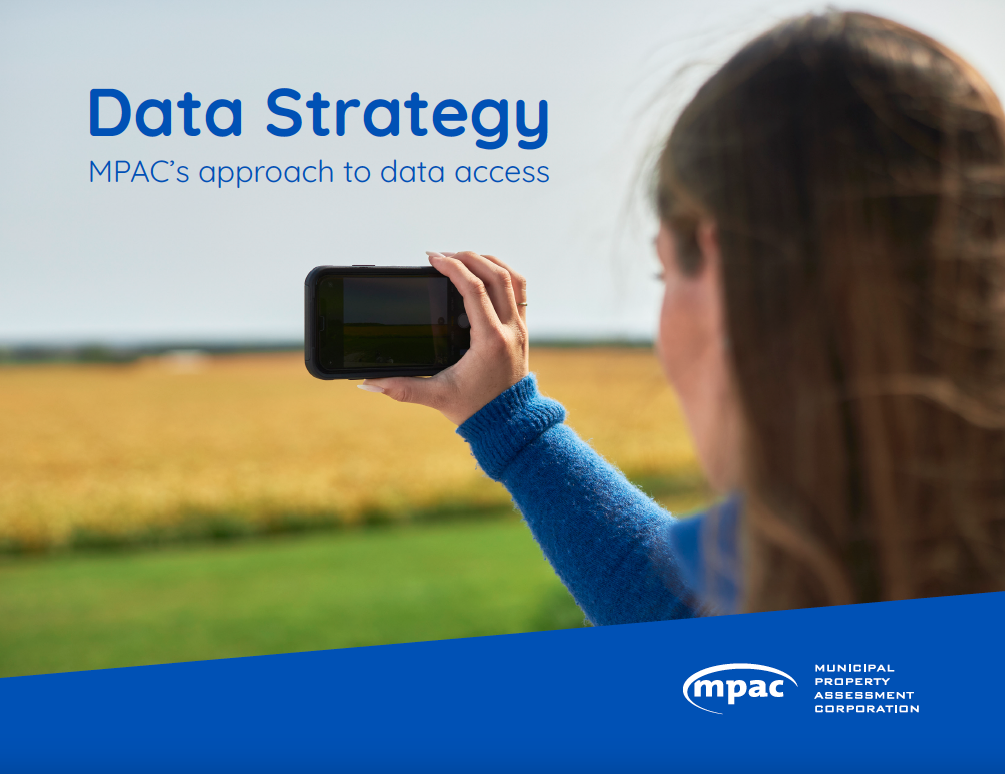What is MPAC data?
We know data security is important to you. MPAC protects individuals’ privacy and respects third-party rights of our data suppliers through rigorous data security, strict adherence to privacy law, and agreements with our partners.
The objectives of the Data Strategy are to:
- Provide transparency into MPAC’s processes, services, and property data.
- Support municipalities' and government partners' current and future strategic and operational needs.
- Become the trusted source of property information and market insights
for Ontarians. - Continue to innovate to create opportunities to grow MPAC’s revenues and
offset municipal levies.
MPAC data case studies
Learn about the ways our partners have used MPAC data to solve a problem or create something new and valuable.
Mailing addresses can be tricky. MPP constituency offices sometimes need help getting accurate address information for constituents falling within their riding, as certain streets and municipalities cross boundary lines.
This can result in mass mailouts about certain government programs being sent to households and or businesses into the adjacent riding, which can cause confusion for community members. Constituents may reach out to the wrong riding, or residents may miss out on crucial details about things happening in their community.
MPAC data can help. In one instance, MPAC was able to help an MPP and their team by running a report based on Election Ontario shape files outlining properties that could be inconvenienced by these mass mailouts. MPAC was able to provide this office with the correct addresses in their riding, allowing them to execute targeted mailings and promote important government programs available in their community.
Ontario’s REALTORS® look to MPAC for valuable property information.
From square footage to building permit history and Automated Valuation Models (AVM) Ontario’s REALTORS® depend on MPAC data to create MLS listings, conduct comparative market analysis, research properties, and customize the services and advice they provide to buyers and sellers for all property types.
MPAC has direct relationships with all Ontario Real Estate Boards, representing over 100,000 REALTORS® across the province, and we offer regular webinars and in-person training sessions to help REALTORS® understand the data resources at their disposal and how to use them. To learn more, visit our Commercial Solutions page.
Natural gas suppliers, oversight agencies, energy advisors and distribution companies in Ontario have been using MPAC data to fuel their businesses for years.
Based on key details such as property type, year of construction, building size, heating and cooling information and locational factors, our privacy-compliant products help design, plan, and offer solutions and services that streamline business processes, reduce energy bills, minimize carbon emissions, and develop services for all property types.
For example, MPAC’s new automated Home Energy Rating and Retrofit Report provides the estimated annual energy consumption, carbon emissions, and energy use breakdown for single-family attached and detached homes, and it offers recommendations on how to retrofit a property to improve energy efficiency and lower emissions.
Want to learn more about how MPAC data can help you go green? Visit our Commercial Solutions page.
Using advanced statistical techniques and sound appraisal methodology, MPAC’s AVM differs from MPAC’s Current Value Assessment, which is based on a legislated valuation date. Updated weekly, the AVM is a credible reflection of changing residential market values.
Lenders, mortgage insurers, real estate professionals, and others who are interested in learning about current values for residential properties use MPAC’s Automated Valuation Model (AVM) to gain access to accurate, real-time market values on over 10 million residential properties in Canada.
For example, with MPAC’s AVM, lenders can quickly and effectively determine the collateral value of a property being financed, and real estate agents can easily access an unbiased second opinion of value.
Boxwood Means LLC, a real estate research and consulting firm that uses MPAC’s AVM states "The MPAC AVM performs well at the national level and can be a very effective part of a loan and insurance program." To learn more about MPAC’s AVM, visit our Commercial Solutions page.
Municipalities face numerous challenges, particularly in ensuring community safety and efficient planning. Accurate property data aids municipalities in zoning, land use planning, infrastructure development, and public safety initiatives, ensuring all projects are based on current and comprehensive information.
For example, the Ministry of Community Safety and Correctional Services and the Office of the Fire Marshal require Community Risk Assessments for adequate fire coverage. Detailed, up-to-date property information from MPAC helps municipalities identify high-risk areas and allocate emergency services effectively, minimizing response times and enhancing safety in your community.
MPAC data can be delivered to municipalities in a secure, password protected .xlsx format on an annual basis. All MPAC Data products provided to municipalities are subject to the Data Sharing and Services Agreement and Data Terms and Conditions of Use, ensuring responsible data usage.
Municipalities are increasingly prioritizing climate action and energy efficiency. MPAC can provide data that supports these initiatives, like the Municipal Energy Plan Program.
MPAC’s data encompasses various property types within municipal boundaries, offering detailed information that allows municipalities to assess current energy use and identify opportunities for improvement. This valuable information supports the strategic, long-term development of robust climate action plans that address specific local needs.
Municipalities can use data to create accurate energy models, aiding in the formulation of energy conservation initiatives and programs. The creation of public energy models based on aggregated MPAC data can also help ignite conservation efforts at a community level, fostering a collaborative approach to energy efficiency.
MPAC data tools to meet your needs
MPAC has a range of data and information tools available for our different partners, depending on your goals. MPAC encourages everyone to use our sophisticated databases and information hubs on our website. Suggested pairings include, but are not limited to:





